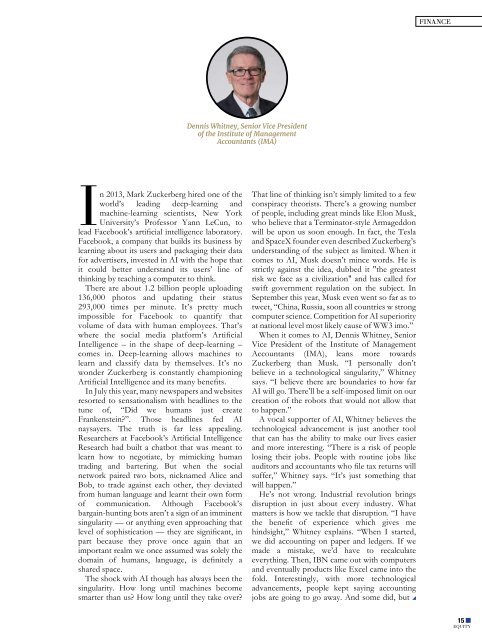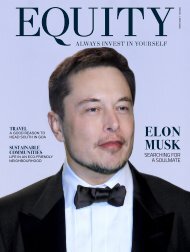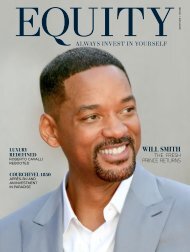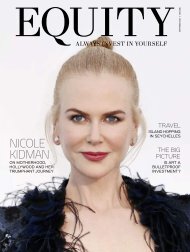Equity Magazine November 2017
- No tags were found...
You also want an ePaper? Increase the reach of your titles
YUMPU automatically turns print PDFs into web optimized ePapers that Google loves.
FINANCE<br />
Dennis Whitney, Senior Vice President<br />
of the Institute of Management<br />
Accountants (IMA)<br />
In 2013, Mark Zuckerberg hired one of the<br />
world’s leading deep-learning and<br />
machine-learning scientists, New York<br />
University’s Professor Yann LeCun, to<br />
lead Facebook’s artificial intelligence laboratory.<br />
Facebook, a company that builds its business by<br />
learning about its users and packaging their data<br />
for advertisers, invested in AI with the hope that<br />
it could better understand its users’ line of<br />
thinking by teaching a computer to think.<br />
There are about 1.2 billion people uploading<br />
136,000 photos and updating their status<br />
293,000 times per minute. It’s pretty much<br />
impossible for Facebook to quantify that<br />
volume of data with human employees. That’s<br />
where the social media platform’s Artificial<br />
Intelligence – in the shape of deep-learning –<br />
comes in. Deep-learning allows machines to<br />
learn and classify data by themselves. It’s no<br />
wonder Zuckerberg is constantly championing<br />
Artificial Intelligence and its many benefits.<br />
In July this year, many newspapers and websites<br />
resorted to sensationalism with headlines to the<br />
tune of, “Did we humans just create<br />
Frankenstein?”. Those headlines fed AI<br />
naysayers. The truth is far less appealing.<br />
Researchers at Facebook’s Artificial Intelligence<br />
Research had built a chatbot that was meant to<br />
learn how to negotiate, by mimicking human<br />
trading and bartering. But when the social<br />
network paired two bots, nicknamed Alice and<br />
Bob, to trade against each other, they deviated<br />
from human language and learnt their own form<br />
of communication. Although Facebook’s<br />
bargain-hunting bots aren’t a sign of an imminent<br />
singularity — or anything even approaching that<br />
level of sophistication — they are significant, in<br />
part because they prove once again that an<br />
important realm we once assumed was solely the<br />
domain of humans, language, is definitely a<br />
shared space.<br />
The shock with AI though has always been the<br />
singularity. How long until machines become<br />
smarter than us? How long until they take over?<br />
That line of thinking isn’t simply limited to a few<br />
conspiracy theorists. There’s a growing number<br />
of people, including great minds like Elon Musk,<br />
who believe that a Terminator-style Armageddon<br />
will be upon us soon enough. In fact, the Tesla<br />
and SpaceX founder even described Zuckerberg’s<br />
understanding of the subject as limited. When it<br />
comes to AI, Musk doesn’t mince words. He is<br />
strictly against the idea, dubbed it "the greatest<br />
risk we face as a civilization" and has called for<br />
swift government regulation on the subject. In<br />
September this year, Musk even went so far as to<br />
tweet, “China, Russia, soon all countries w strong<br />
computer science. Competition for AI superiority<br />
at national level most likely cause of WW3 imo.”<br />
When it comes to AI, Dennis Whitney, Senior<br />
Vice President of the Institute of Management<br />
Accountants (IMA), leans more towards<br />
Zuckerberg than Musk. “I personally don’t<br />
believe in a technological singularity,” Whitney<br />
says. “I believe there are boundaries to how far<br />
AI will go. There’ll be a self-imposed limit on our<br />
creation of the robots that would not allow that<br />
to happen.”<br />
A vocal supporter of AI, Whitney believes the<br />
technological advancement is just another tool<br />
that can has the ability to make our lives easier<br />
and more interesting. “There is a risk of people<br />
losing their jobs. People with routine jobs like<br />
auditors and accountants who file tax returns will<br />
suffer,” Whitney says. “It’s just something that<br />
will happen.”<br />
He’s not wrong. Industrial revolution brings<br />
disruption in just about every industry. What<br />
matters is how we tackle that disruption. “I have<br />
the benefit of experience which gives me<br />
hindsight,” Whitney explains. “When I started,<br />
we did accounting on paper and ledgers. If we<br />
made a mistake, we’d have to recalculate<br />
everything. Then, IBN came out with computers<br />
and eventually products like Excel came into the<br />
fold. Interestingly, with more technological<br />
advancements, people kept saying accounting<br />
jobs are going to go away. And some did, but<br />
15<br />
EQUITY
















